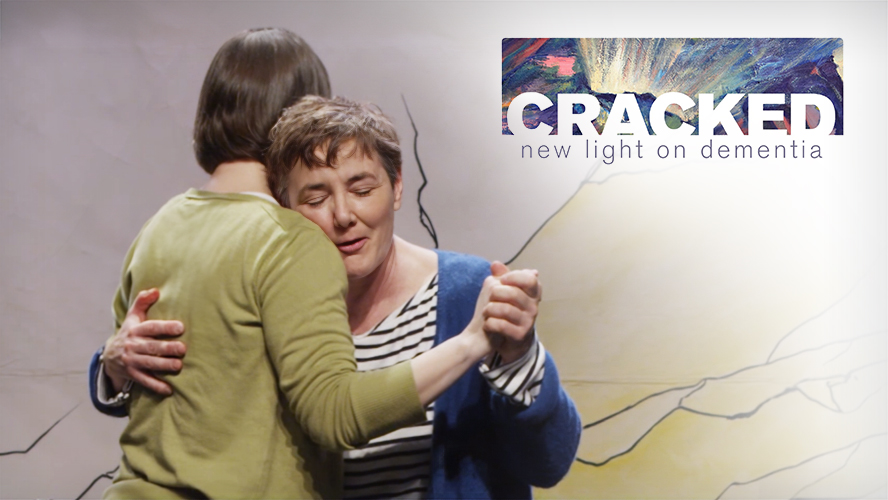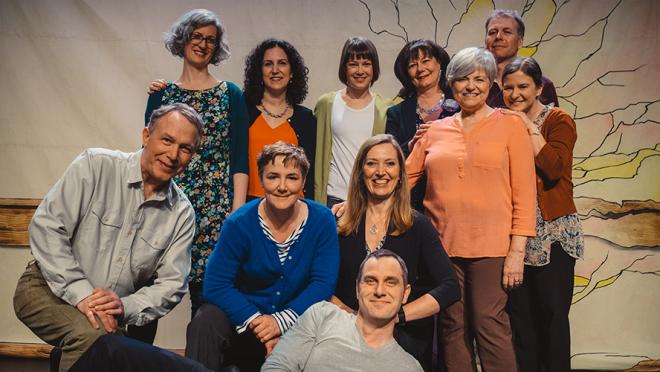
A new study from UHN’s KITE Research Institute explored how the Canadian research-based drama film ‘Cracked: new light on dementia’ reduced dementia stigma within community care settings.
“Our study confirmed how arts-based approaches can be used to emotionally engage audiences and change their perception of individuals living with dementia,” says Dr. Pia Kontos, a KITE Senior Scientist and senior author of the study.
Cracked follows the stories of two women who have been diagnosed with dementia. The film explores the impact of stigma on the protagonists' journeys through the healthcare system and how stigma can be reduced through relational caring—an approach that focuses on supporting meaningful relationships with people living with dementia.
To evaluate the effectiveness of the film, the research team interviewed 32 individuals—family carers, community-based carers and members of the general public—over a period of eight months following a screening of the film.
“With our approach, participants had an opportunity to reflect on their experiences and explore how they connected with different aspects of the film,” says Romeo Colobong, Research Associate in Dr. Kontos’ lab and a co-author of the study.
“Through analyzing the interviews, we found that the perceptions of those who watched the film had changed,” adds Mr. Colobong.

(L-R) Dr. Pia Kontos, KITE Senior Scientist and senior author of the study; Romeo Colobong, Research Associate.
Participants reported reduced levels of stigma due to an increased capacity for relational caring. With a better understanding of dementia, participants experienced changes in their knowledge and actions. They developed an increased understanding of people living with dementia and their carers and gained awareness of the impact of their actions and emotions. They also acknowledged the capacity of people with dementia to have meaningful relationships and recognized the need to challenge the injustices and inequities that contribute to stigma.
Participants also reported being more open to a dementia diagnosis and supportive of engaging with individuals who are living with dementia in various aspects of life. These changes included displaying more patience, refraining from correcting or reorienting individuals, embracing compassion and building meaningful connections.
The artistic elements and compelling storytelling within film—particularly the use of techniques such as theatre, music and dance—helped create more realistic and relatable characters and storylines for participants, promoting emotional connection, learning and change.
“These findings highlight the impact of art-based strategies for combating dementia stigma and promoting relational caring,” adds Dr. Kontos. “This research is an example of the power of film to drive positive change in dementia care and move towards a more inclusive and unprejudiced society.”
To learn more about the film, visit https://crackedondementia.ca/, where you can download and support the initiative.
This work was supported by the Alzheimer Society of Canada and the UHN Foundation. Dr. Pia Kontos is a Professor at the Dalla Lana School of Public Health.
Kontos P, Grigorovich A, Dupuis SL, Colobong R, Gray J, Jonas-Simpson C, Serota A. Projecting a critique of stigma associated with dementia on screen: The impact of a Canadian film on the importance of relational caring in the community. Gerontologist. 2023 Apr 17:gnad045. doi: 10.1093/geront/gnad045. Epub ahead of print.

The interdisciplinary team behind ‘Cracked: new light on dementia” was composed of researchers and artists who had a shared passion for reducing dementia stigma. (L-R, top to bottom) Julia Gray, Pia Kontos, Lori Nancy Kalamanski, Sherry Dupuis, Susan Applewhaite, Tim Machin, Claire Frances Muir, Alan K. Sapp, Mary Ellen MacLean, Christine Jonas-Simpson and Andy Pogson. Photo by Kelly Kruschel.




